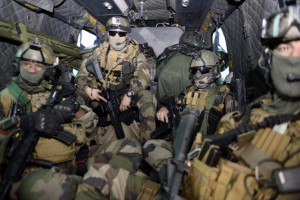With IS just 200 miles from the shores of Europe, international powers have grown increasingly concerned about the group’s close proximity, which has led to mounting reports of covert military operations taking place on Libyan territory.
Kobler, the UN envoy, previously told MEE that the priority in Libya was not international military assistance, but rather forming a united army that could re-establish order and take on IS.
However, the GNA has failed to establish its authority fully, and a rival parliament in the Libya’s east – the House of Representatives – continues to operate in defiance of international pressure.
Despite the lack of a functioning unity government, American, British, Jordanian and French special forces have all been reported to be carrying out military operations against IS in Libya.
On 12 May, the Washington Post quoted unnamed American officials who confirmed two teams of under 25 troops had been deployed to the cities of Misrata and Benghazi to “identify potential allies among local armed factions and gather intelligence on threats”.
In March, MEE revealed that British and Jordanian special forces were working together in covert operations against IS, while in February Reuters reported that elite French troops were advising Libyan troops in the east about how to take on IS.
Over the weekend, Britain’s Daily Mail reported that “up to 50” British troops may be deployed to Libya this week, after the British Royal Air Force carried out a cyber attack against the IS stronghold of Sirte.
Meanwhile, after reports in March suggested Italy might send up to 5,000 troops into Libya, the country’s Prime Minister Matteo Renzi told Italian daily Corriere della Serra ahead of the summit that Nepalese troops would be sent to support the UN Support Mission in Libya instead of Italians.
International forces are likely to struggle in finding a reliable local partner as long as domestic political divisions continue to plague Libya.
The GNA has failed to get the endorsement of veteran army strongman Khalifa Haftar, who has launched a war against militias that he says is aimed at ridding the country of Islamists, but which his opponents claim is a power grab aimed at returning Libya to authoritarianism.
A rival Tripoli-based government – the self-declared Government of National Salvation – has also not recognised the GNA unequivocally, with its prime minister telling his cabinet to continue work in April despite a statement issued under the administration’s name declaring support for the GNA.
However, the unity government has garnered support from key institutions including the central bank and the NOC.
Libya’s divisions have deepened in recent days, with the GNA and Haftar forces each announcing separate plans to fight IS and “liberate” Sirte.
“This is a mistake. It must be prevented… we can no longer accept this division,” said Nicola Latorre, chairman of the defence committee of the Italian senate and an IS expert.
He said Haftar’s bid to take on IS alone would undermine the UN-backed government, adding that the Vienna talks could help unite ranks and possibly lead to the creation of an international contact group on Libya.



